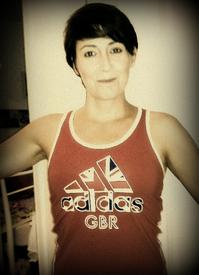My heart rate is high

marlanejeanette
Posts: 3
I just used a Polar HRM for the first time today. I followed the instructions and have double checked my stats. I am 5'2", 120lbs, and run about 14miles a week. My HR was way over my target during a slow run today. Even when I slowed to a walk for a mile, my HR was over my targeted rate. It shows my resting heart rate in the 80s. After looking through this website, this number sounds very high. I'm not sure if there is something wrong with my HRM or something wrong with me. Or if some people just have faster heart rates... Any ideas?
0
Replies
-
My resting heart rate is in the 70-80's range. But I am not 120lbs, lol
I think thinner people do have higher rates.
I would go have a stress test done with your doctor (they hook you up to monitors while you run on a treadmill). They can help you much better.0 -
60 to 90 bpm is the normal range for resting heart rates for adults. (when dd you check your RHR?)
When you say your heart rate was "way over my target" what do you mean?0 -
Everyone's is different. The range is just the average. When I first got my HR monitor, I thought the same thing. However, I had metabolic testing done to give me my specific zones and they are much higher than the typical range for my age. What was it for your run at what speed?0
-
The number on the watch screen is the percentage, not the bpm- correct? I was always in the 90's, running at 10min15sec. miles. My normal pace is 9.5min/mi., so today seemed like light exercise. However, it is almost 100 degrees outside. Does that factor? I tried to check my RHR about 30 min. after my run and was in the 80s. Just tried again, though, and it shows 50.0
-
RHR is the HR you have first thing in the morning when you wake up but before you get out of bed.0
-
RHR is the HR you have first thing in the morning when you wake up but before you get out of bed.
Thank you. Been exercising for a while, but tracking what I'm doing is new to me.0 -
I never pay attention to my HR while exercising, I view only Perceived Rate of Exertion for my training. My resting HR is about 45. I'm 42 and 5'4" about 120 lbs. I never worry about zone, fat burning zone, target zone none of that. What is important to me is that I am not pushing to hard while running, and more important to me, how quickly I recovery after I stop. I"m generally back down to normal fairly quickly. Example - my average on my run today 18 miles was 158, I didn't feel like I was pushing, went faster than training pace, kept telling myself to slow down. I was singing outloud to the songs on my ipod. I felt great.0
-
Also, if you're running outside in high heat your heartrate can be 10 or 15 bpm higher than usual for any given effort.0
-
Hey - I'm in the same position and it worried me too - I went to the doctors and explained and they did a series of checks and I'm fine = just one of those things, but it set my mind at rest to get checked!0
-
The number on the watch screen is the percentage, not the bpm- correct? I was always in the 90's, running at 10min15sec. miles. My normal pace is 9.5min/mi., so today seemed like light exercise. However, it is almost 100 degrees outside. Does that factor? I tried to check my RHR about 30 min. after my run and was in the 80s. Just tried again, though, and it shows 50.
I'm not sure - it depends on your model and how you have the display set up.
If it's displaying percentages check your owners manual to change the display to actual BPM. The percentages are actually pretty meaningless as they tend to use 220-your age as the maximum heart rate. Run based on perceived effort rather than fixating on the zone or & of MaxHR you're at.
If you want an accurate max heart rate number you need to do a stress test.0 -
People should not pull their HRMs out of the box, put them on, and then start letting them rule their workouts. HRMs are passive devices--they are not intelligent and they know NOTHING about you, except what you program into them.
At least 30% of the population (probably higher among females) has a true max HR that is significantly higher than the age-predicted number that the HRM initially calculates. Add in thermal stress from running in the heat.
When it cools down, put on your HRM and do for a run. Run at your normal pace. Do not look at the HRM for 10 minutes or so. Then start observing and see what your actual heart rate is when you exercise.
Do the same thing on different runs--work at different intensities. You get a sense of your HR. If it is consistently high, then you need to manually increase the Max HR setting on the HRM. What that number should be I can't say--you can either do a max test (not recommended) or you can try to estimate based on the HR response to your harder workouts.0 -
Make sure you heart rate monitor is working correctly. Put it on, and take your heart rate manually (just in case you don't know -- put index and middle finger on radial pulse, count each beat for 15 seconds and times by 4). Check your heart rate monitor and see if they are the same.
You sound like you exercise on a daily basis, so your resting heart rate should be lower than someone who does not exercise regularly.. Usually, I've seen people's heart rates in the 40's or 50's because of the well exercised heart. 80 is normal, but if it is high for you, maybe you are dehydrated. Being dehydrated will increase your heart rate, or if you have a fever.0
This discussion has been closed.
Categories
- All Categories
- 1.4M Health, Wellness and Goals
- 397K Introduce Yourself
- 44.2K Getting Started
- 260.9K Health and Weight Loss
- 176.3K Food and Nutrition
- 47.6K Recipes
- 232.8K Fitness and Exercise
- 456 Sleep, Mindfulness and Overall Wellness
- 6.5K Goal: Maintaining Weight
- 8.7K Goal: Gaining Weight and Body Building
- 153.3K Motivation and Support
- 8.3K Challenges
- 1.3K Debate Club
- 96.5K Chit-Chat
- 2.6K Fun and Games
- 4.5K MyFitnessPal Information
- 16 News and Announcements
- 18 MyFitnessPal Academy
- 1.4K Feature Suggestions and Ideas
- 3.1K MyFitnessPal Tech Support Questions







